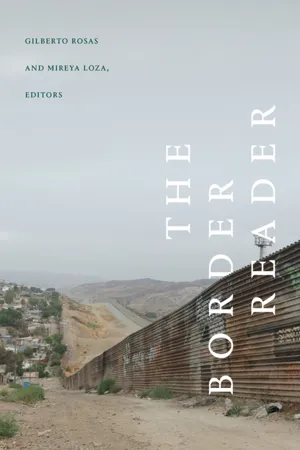
- 720 pages
- English
- PDF
- Available on iOS & Android
eBook - PDF
The Border Reader
About this book
The Border Reader brings together canonical and cutting-edge humanities and social science scholarship on the US-Mexico border region. Spotlighting the vibrancy of border studies from the field's emergence to its enduring significance, the essays mobilize feminist, queer, and critical ethnic studies perspectives to theorize the border as a site of epistemic rupture and knowledge production. The chapters speak to how borders exist as regions where people and nation-states negotiate power, citizenship, and questions of empire. Among other topics, these essays examine the lived experiences of the diverse undocumented people who move through and live in the border region; trace the gendered and sexualized experiences of the border; show how the US-Mexico border has become a site of illegality where immigrant bodies become racialized and excluded; and imagine anti- and post-border futures. Foregrounding the interplay of scholarly inquiry and political urgency stemming from the borderlands, The Border Reader presents a unique cross section of critical interventions on the region.
Contributors. Leisy J. Abrego, Gloria E. Anzaldúa, Martha Balaguera, Lionel Cantú, Leo R. Chavez, Raúl Fernández, Rosa-Linda Fregoso, Roberto G. Gonzales, Gilbert G. González, Ramón Gutiérrez, Kelly Lytle Hernández, José E. Limón, Mireya Loza, Alejandro Lugo, Eithne Luibhéid, Martha Menchaca, Cecilia Menjívar, Natalia Molina, Fiamma Montezemolo, Américo Paredes, Néstor Rodríguez, Renato Rosaldo, Gilberto Rosas, María Josefina Saldaña-Portillo, Sonia Saldívar-Hull, Alicia Schmidt Camacho, Sayak Valencia Triana, Carlos G. Vélez-Ibáñez, Patricia Zavella
Contributors. Leisy J. Abrego, Gloria E. Anzaldúa, Martha Balaguera, Lionel Cantú, Leo R. Chavez, Raúl Fernández, Rosa-Linda Fregoso, Roberto G. Gonzales, Gilbert G. González, Ramón Gutiérrez, Kelly Lytle Hernández, José E. Limón, Mireya Loza, Alejandro Lugo, Eithne Luibhéid, Martha Menchaca, Cecilia Menjívar, Natalia Molina, Fiamma Montezemolo, Américo Paredes, Néstor Rodríguez, Renato Rosaldo, Gilberto Rosas, María Josefina Saldaña-Portillo, Sonia Saldívar-Hull, Alicia Schmidt Camacho, Sayak Valencia Triana, Carlos G. Vélez-Ibáñez, Patricia Zavella
Tools to learn more effectively

Saving Books

Keyword Search

Annotating Text

Listen to it instead
Information
Publisher
Duke University Press BooksYear
2023Print ISBN
9781478024934, 9781478020257eBook ISBN
9781478027195Table of contents
- Cover
- Contents
- Introduction: On Theories from the Ends / Gilberto Rosas and Mireya Loza
- Part I: Locating the Border
- Part II. Documenting Identities
- Part III: En/Gendering Borders
- Part IV. Othering Spaces, Othering Bodies
- Part V. Border Crossings
- Part VI. New Border Imaginaries
- Contributors
- Credits
- Index
Frequently asked questions
Yes, you can cancel anytime from the Subscription tab in your account settings on the Perlego website. Your subscription will stay active until the end of your current billing period. Learn how to cancel your subscription
No, books cannot be downloaded as external files, such as PDFs, for use outside of Perlego. However, you can download books within the Perlego app for offline reading on mobile or tablet. Learn how to download books offline
Perlego offers two plans: Essential and Complete
- Essential is ideal for learners and professionals who enjoy exploring a wide range of subjects. Access the Essential Library with 800,000+ trusted titles and best-sellers across business, personal growth, and the humanities. Includes unlimited reading time and Standard Read Aloud voice.
- Complete: Perfect for advanced learners and researchers needing full, unrestricted access. Unlock 1.4M+ books across hundreds of subjects, including academic and specialized titles. The Complete Plan also includes advanced features like Premium Read Aloud and Research Assistant.
We are an online textbook subscription service, where you can get access to an entire online library for less than the price of a single book per month. With over 1 million books across 990+ topics, we’ve got you covered! Learn about our mission
Look out for the read-aloud symbol on your next book to see if you can listen to it. The read-aloud tool reads text aloud for you, highlighting the text as it is being read. You can pause it, speed it up and slow it down. Learn more about Read Aloud
Yes! You can use the Perlego app on both iOS and Android devices to read anytime, anywhere — even offline. Perfect for commutes or when you’re on the go.
Please note we cannot support devices running on iOS 13 and Android 7 or earlier. Learn more about using the app
Please note we cannot support devices running on iOS 13 and Android 7 or earlier. Learn more about using the app
Yes, you can access The Border Reader by Gilberto Rosas, Mireya Loza, Gilberto Rosas,Mireya Loza in PDF and/or ePUB format, as well as other popular books in Social Sciences & North American History. We have over one million books available in our catalogue for you to explore.